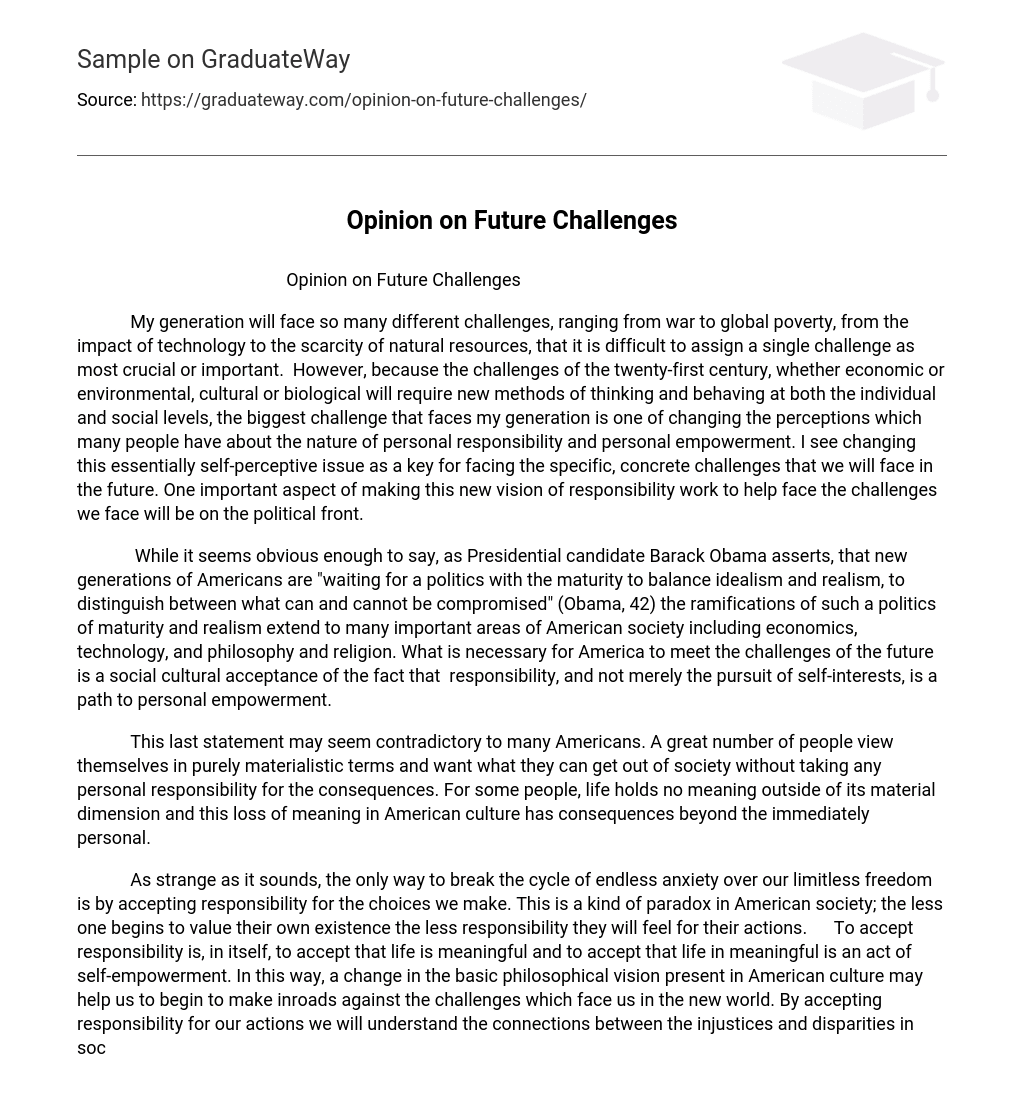Opinion on Future Challenges
My generation will face so many different challenges, ranging from war to global poverty, from the impact of technology to the scarcity of natural resources, that it is difficult to assign a single challenge as most crucial or important. However, because the challenges of the twenty-first century, whether economic or environmental, cultural or biological will require new methods of thinking and behaving at both the individual and social levels, the biggest challenge that faces my generation is one of changing the perceptions which many people have about the nature of personal responsibility and personal empowerment. I see changing this essentially self-perceptive issue as a key for facing the specific, concrete challenges that we will face in the future. One important aspect of making this new vision of responsibility work to help face the challenges we face will be on the political front.
While it seems obvious enough to say, as Presidential candidate Barack Obama asserts, that new generations of Americans are “waiting for a politics with the maturity to balance idealism and realism, to distinguish between what can and cannot be compromised” (Obama, 42) the ramifications of such a politics of maturity and realism extend to many important areas of American society including economics, technology, and philosophy and religion. What is necessary for America to meet the challenges of the future is a social cultural acceptance of the fact that responsibility, and not merely the pursuit of self-interests, is a path to personal empowerment.
This last statement may seem contradictory to many Americans. A great number of people view themselves in purely materialistic terms and want what they can get out of society without taking any personal responsibility for the consequences. For some people, life holds no meaning outside of its material dimension and this loss of meaning in American culture has consequences beyond the immediately personal.
As strange as it sounds, the only way to break the cycle of endless anxiety over our limitless freedom is by accepting responsibility for the choices we make. This is a kind of paradox in American society; the less one begins to value their own existence the less responsibility they will feel for their actions. To accept responsibility is, in itself, to accept that life is meaningful and to accept that life in meaningful is an act of self-empowerment. In this way, a change in the basic philosophical vision present in American culture may help us to begin to make inroads against the challenges which face us in the new world. By accepting responsibility for our actions we will understand the connections between the injustices and disparities in society and the damages which have been inflicted upon the environment.
Though some of our challenges may be economic and some may be based in moral and ethical issues, the unifying factor is always: human responsibility. We begin to understand ourselves much more clearly and understand our challenges more clearly when we admit that we live in a world which “desperately needs fixing and in which denial is seductively easy and cheap, at least for a time. We must acknowledge and seek to understand the connection between poverty, social injustice, and environmental degradation.” (Orr 89)
The future corporation will accept responsibility for its actions and view itself as shaped by not only economic forces but social needs and in so recognizing other forms of “success” and “profit” namely, the maintaining of ethical and environmental standards which contribute to the overall growth and well-being of humanity may over-ride present-day obsession with self-interest and materialistic profit.
Works Cited
Obama, Barrack. The Audacity of Hope.
Orr, David W. The Nature of Design: Ecology, Culture, and Human Intention. New York:
Oxford University Press, 2002.
.





